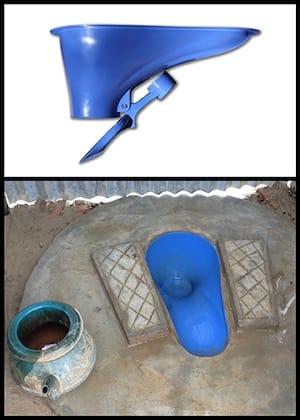Piscataway, N.J. — LIXIL Corporation, a global leader in the housing products and building materials industry, announced that in collaboration with American Standard Brands, its wholly owned subsidiary in the U.S., it supplied UNICEF Philippines with 10,000 SaTo hygienic toilet pans to support reconstruction efforts in the aftermath of the devastation of Typhoon Haiyan.

The mechanical and water seals created by this trap-door style SaTo hygienic toilet pan have improved the quality of life for residents of Bangladesh by keeping flies and insects out, in addition to reducing the unpleasant sights and smells, of open pit latrines.
SaTo – pronounced SAH-toh, derived from “Safe Toilet” – is a sanitary toilet pan designed by American Standard Brands for use in Bangladesh. It works without sewer infrastructure and uses ingeniously simple mechanical and water seals to close off pit latrines from the open air, reducing the transmission of disease. LIXIL and American Standard collaborated to donate these pans to the Philippines, where UNICEF estimates that as many as 4 million children may be affected by the disaster. UNICEF intends to employ the toilet pans as an interim solution until the sewage system in the area can be rebuilt.
“We are delighted UNICEF will be using the toilet pans to effectively improve sanitation in the disaster-stricken area. Improving world sanitation is a key corporate social responsibility (CSR) initiative for LIXIL,” said Harumi Matsumura, executive officer and senior managing director, public relations, CSR and environmental for Lixil.
This commitment to supporting the area is in addition to the 10 million JPY ― nearly $100,000 in U.S. dollars ― and 10,000 plates, bowls and spoons donated immediately after the typhoon struck in November 2013.
In addition to emergency responses such as these, LIXIL is implementing the “ISIS 2018” Project, as part of a wider program focused on improved sanitation with UNICEF. This initiative was formalized in a Memorandum of Understanding (MOU) between the two organizations in November 2013.
Victoria Bolam, global brand and CSR director for Lixil, explained that the Improved Sanitation In Schools 2018 (ISIS 2018) program will provide improved sanitation facilities and education to 2,018,000 school children worldwide by the end of 2018. A minimum of 44,000 children will benefit from sanitation education and basic sanitation kits in the Philippines in 2014, and 16,000 school children in rural schools in China will receive new toilet facilities in July 2014.
“LIXIL’s most challenging ISIS project is the installation of eco-sanitation toilet systems in schools located in the poorest and most marginalized communities in Mukuru, Nairobi. These involve design, construction, education, maintenance, compost manufacture and compost sales. The first system will be installed at the beginning of April this year, and will benefit up to 400 children,” said Bolam. “Improved sanitation is not just about toilets. It is about improved health, education, safety, and, most importantly, dignity. We are committed to finding workable, scalable solutions which provide an impactful solution to this global issue,” she concluded.




Join the conversation: